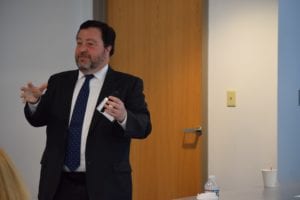Who is a member?
Our members are the local governments of Massachusetts and their elected and appointed leadership.

Cohasset Town Manager Christopher Senior discusses shared services during the Massachusetts Selectmen’s Association Leadership Conference on June 8 in Sharon.
Collaboration and sharing municipal services were prominent topics during the Massachusetts Selectmen’s Association annual Leadership Conference, a full-day event for newly elected and veteran selectmen, held on June 8 in Sharon.
The conference featured breakout sessions, keynote presentations and opportunities to network with other selectmen and the MSA board members. Nearly 100 selectmen attended sessions designed for varying levels of local government experience, covering municipal finance, building consensus, the open meeting and public records laws, and shared services.
Sen. Jason Lewis, the closing keynote speaker, discussed priorities on Beacon Hill, particularly school finance reform. Sen. Lewis is co-chair of the Joint Committee on Education.
Tara Lynch, senior project manager for the Division of Local Services’ Technical Assistance Bureau, discussed ways the division can help communities that are considering shared-service opportunities, as well as relevant statutes.
“It’s important to understand the objectives of the shared service that you’re looking at, because we are often thinking about it in the context of, ‘How much money can we save?’” Lynch said. “Sometimes there won’t be that much savings, but it’s legitimate to look … because it’s the best way to sustain your operations, by collaborating with another community.”
Lynch walked attendees through a recent example from the towns of Lee and Lenox, which share a chief administrative officer under an intermunicipal agreement that required approval from the Legislature. She said the Division of Local Services is pushing for a change in state law to allow these kinds of arrangements, so communities don’t have to file a bill to do it.
“Timing is always crucial when it comes to fertile ground for sharing a service,” Lynch said, “whether there are changes in statutes or regulations, or a rash of retirements and expiring contracts.”
Lynch recommended choosing “natural partners,” based on geography and history.
The DLS offers a range of resources to help communities with sharing services, including a municipal databank and legal staff.
Cohasset Town Manager Christopher Senior discussed the topic from the viewpoint of municipal leadership. He highlighted a large and small example of sharing services in his community.
“We all face the same pressure to expand and have higher-value services, and we all want to maximize resources,” Senior said. “What makes the most sense to share? How do you merge within communities that have disparities? … You don’t have to give up local to be regional.”
Cohasset is part of the South Shore Regional Emergency Communications Center with three other communities. While the creation process was arduous, the communities, and their communications, are better for it, Senior said.
“It was a tremendous amount of work: procurement, procedures, hiring, communication between towns, police and fire in each town, major investment of staff resources and financial resources, local control issues,” Senior said. “There will be hiccups.
“We have much better training and a better product. There is much better communication, and we can get grants together that we wouldn’t get alone.”
Cohasset also shares a full-time animal control officer with Hull and Norwell. The position is hosted by Hull and paid into by the other two towns.
“We had different but complementary needs,” Senior said.
All speakers recommended using any opportunity to network with similar or surrounding communities.
“Why not share in general?” Senior said. “Policies or ideas, we don’t need to reinvent the wheel.”
Foxborough Town Manager Bill Keegan, whose town is looking at sharing a fire station with neighboring Mansfield, said, “We have to have those conversations because it is getting too expensive to be single-minded.”